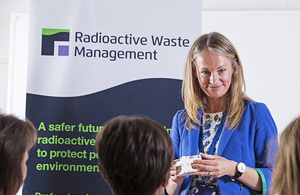Advancing counter-terrorism initiatives
Thank you, Mr President. I would like to congratulate Indonesia on assuming the presidency of the Security Council and also thank Indonesia for a consistent effort to advance counter-terrorism initiatives.
I also thank the briefers, Undersecretary-Generals Vladimir Voronkov and Ghada Fathi Waly, for your presentations today.
Mr President, the United Kingdom welcomes ongoing efforts to deepen understanding about the link between organised crime and terrorism. The current threat posed by these linkages varies from country to country and even within regions.
The threats to domestic interests can be quite different to the threat to international interests. And this necessitates a more sophisticated and nuanced response by governments. For example, in the United Kingdom, while interactions between terrorists and criminals occur, they have not yet led to a notable increase in the threat. But in some countries, criminal gangs help facilitate a more permissive environment within which terrorists can operate, as well as provide resources and funding. While the potential linkages vary by context, we recognise that in many places they may derive from similar underlying conditions. In our view, this highlights the importance of a broad preventative approach and one which strengthens capacities to ensure effective legal and criminal justice responses. We should also be very aware of the potential impact on individuals’ livelihoods when trying to disrupt previously licit or even illicit economic activities because of that potential benefit to terrorists. We therefore encourage the United Nations and Member States to take this opportunity to tackle common drivers such as economic hardship and vulnerable, and marginalised communities whilst ensuring that all measures to tackle terrorism and serious and organised crime are in accordance with international humanitarian law and international human rights law.
Mr President, we welcome the commitment shown by many Member States in ratifying international and regional counter-terrorism legislation and implementing International Protocols and Conventions. We urge the United Nations and its Member States to continue to strengthen law enforcement and intelligence efforts to deny malign actors safe spaces in which to operate. This includes strengthening inter-agency cooperation and international coordination, as well as tackling illicit financial flows and the misuse of online spaces, for example.
It is therefore critical to prevent terrorist use of the Internet and to ensure that there are no safe spaces online for all forms of terrorists to promote or share their extreme views, to incite attacks, recruit members and indeed obtain resources. In 2010, we set up the Counter-Terrorism Internet Referral Unit based in the Metropolitan Police to date in excess of 310,000 individual pieces of terrorist content referred by that unit have been removed by companies. The unit has also informed the design of the EU Internet referral unit based at Europol.
Mr President, we welcome the Global Internet Forum to Counter Terrorism’s announcement establishing itself as an independent organisation. We are delighted to sit on the newly established Independent Advisory Committee with colleagues from civil society, academia and our international partners and UN partners like CTED. On serious and Organised Crime specifically, the United Kingdom has established complementary global networks to combat serious and organised crime and terrorist threats through our Serious and Organised Crime Network and the Counter Terrorism and Extremism Network. They work across government to deliver on our objectives, taking into account principles of both justice and national security. More broadly to date, the United Kingdom spent over $54 million on CT programmes in 2019, focused on multilateral campaigns and supporting partner countries. In addition, we spend over $30 million on wider security measures. Through the Serious and Organised Crime Network we are piloting a project aimed at combating serious organised crime and counter-terrorism intersection.
It is important the multilateral organisations such as the United Nations, UNODC and Interpol work in partnership with one other. This is vital at a time when scarce resources are sometimes being redirected to deal with the COVID-19 pandemic. The United Nations is uniquely placed to bring together relevant expertise and resources to help coordinate efforts while ensuring they are underpinned by the rules based system, which will bolster international security and capabilities.
The international community should also consider how best to support vulnerable communities at risk of involvement in organised crime or terrorism in fragile and conflict affected states. The additional pressures they face make it likely that the threat is higher in those environments.
To tackle terrorism, our aim is to disrupt the immediate threat of attacks, but also address the longer term factors which enable terrorist groups to grow and continue, whether that be at home, online or overseas. Our approach reflects our commitment not only to reduce the risk from all forms of terrorism, but to do so in a way that is consistent with and indeed advances our commitment to human rights and the rule of law. We recognise that success has come from strong international collaboration and we hope this will continue to be the case in future.
Mr President, we come together nearly a year after this Council adopted Resolution 2482 and much has changed in that time. The resolution was forward-looking and stressing the importance of ensuring that all counter-terrorism measures take note of impartial humanitarian assistance so that key actors can continue to deliver critical support in complex environments. States and communities are confronting the unprecedented spectre of Covid-19, and now more than ever it is essential that we ensure that international efforts are responsive and adaptive to a rapidly changing environment.
Thank you, Mr President.
